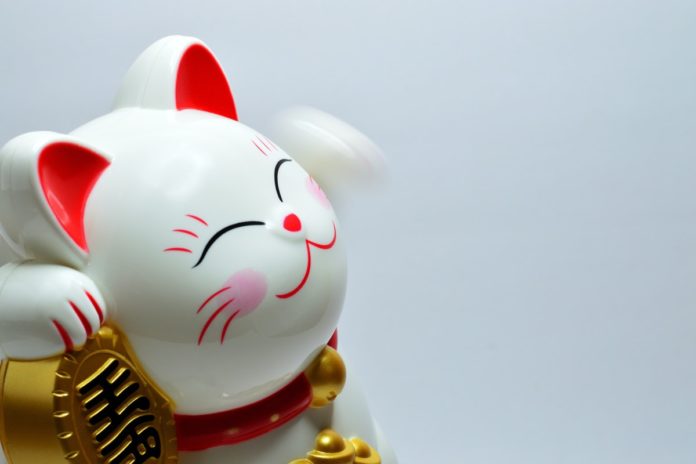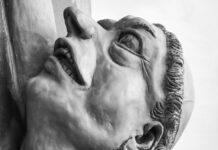Translated from the Arabic by Essam M. Al-Jassim
He woke up early, as usual, and slipped swiftly from beneath the immense pile of blankets to glance at the work he’d left on his bedside table the night before. Sheets of paper lying in a semicircle held the potential titles for his biggest project—a memoir. His current favorite, written in bold letters, was, My Striving: A Diary of a Belligerent Warrior. Until he had the right title, the honorable general did not see how he could begin writing. It would have to wait.
He dragged himself toward the bathroom, stood before the dilapidated old mirror, and spread shaving cream over his lower jaw. The general had a huge flathead like a bookshelf, unyielding black eyes, a bushy mustache turned yellow by his boundless love for tobacco, and a genetic fissure that divided his protruding chin into two square halves.
After shaving, he rinsed his face with cold water and ran the palm of his hand back and forth across his skin to make sure he hadn’t missed a spot. Then he performed a proper military salute to his mirror image, spun on his heel, and marched to the kitchen, a strict routine he had repeated for almost half a century. With a calculated move, he opened the refrigerator. Chilled air spilled out from the empty interior. He shut it violently, cursing his misfortune.
A car horn blared outside. The general started, his right eye narrowing in disgust and discomfort. He opened the kitchen window and looked out into the street. “What an absence of politeness,” he grumbled to no one in particular. He left the window open and returned to the bedroom, passing down the hall no longer used by anyone but himself and the two soldiers who resided in dust-covered frames on the wall.
From his vast wardrobe, the general pulled out the winter army uniform he kept preserved in a long, clear, plastic bag. He gazed at it with admiration, as he often did. Military decorations and medals all hung in their proper places, embellishing it to an admirable degree. But what was this? His eyebrows shot almost to the top of his head, and his mustache trembled sharply. There are small holes all over the vest!
“You should’ve put some mothballs in the pockets,” his wife whispered derisively.
“May Allah curse you and the mites,” he snarled.
Actually, the general’s wife had died four years previously, after he had expelled her from their home to live with her new husband and their daughter in a suburb of the city.
He flicked the outfit with his fingers disapprovingly but remained determined to wear it, convincing himself the holes were not visible.
After he finished dressing, the general inspected himself in the mirror. The uniform hung loosely from his bony shoulders. His paunch had long since vanished; his backside was nearly atrophied. He wished he had kept his military academy graduation uniform. After a futile search for his beret, he kicked the ottoman, throwing curses at everything.
I must recreate those days in my mind. I must reanimate and duplicate the sphere so as to be able to write.
Sitting at his desk, the general poised his pen over the page to commence writing, but he could not find the appropriate point at which to begin describing his long life’s journey.
Eventually, after half an hour of trying, he massed his papers into a transparent file case and shoved it under his armpit as if it were a field marshal’s baton—or the mace he used to carry.
Leaving his house, the general entered a café, bought a great quantity of cheese-and-thyme pies, and ordered a large cup of tea. As soon as he started eating, inspiration hit. His narrative skills and ingenuity burst forth. Chewing a bite of pie, he took out his papers and scribbled down his thoughts.
I was born and raised in a family with a long history of military service. My father served as a general, and my elder brother perished during a training tour on a Sukhoi plane, so I felt obligated to continue this honorable family legacy. I enlisted in the army, and my life became an adventure on the fronts, where I witnessed this beloved country’s wars against the brutal Israeli enemy.
In fact, the general’s elder brother had died in Moscow—not during flight training—when he fell asleep in the snow outside a bar one night and froze solid. Indeed, the general had not witnessed or engaged in any combat either, nor had he seen any frontline fighting throughout his military service, except on maps. His late father, a general himself, had secured him a safe position in the Martyrs’ Affairs Foundation—an effortless office job where the most dangerous threat was a paper cut.
The general squinted his right eye and scratched out what he’d just jotted down.
“Nonsense,” he muttered angrily. “This introduction is trivial as if a primary school student had written it. I have to think of something more exciting.”
He snatched up the paper, used it to wipe the oil and thyme from his mouth, then crumpled it and threw it away. Nervously, he brought out a roll of tobacco and took a moment to reminisce over days long past.
When he was satisfied with his thoughts, he resumed writing. I feel like I’m being followed. People are watching me. Beyond doubt, global intelligence agencies want to kidnap me to get the confidential information I possess.
A bright smile blossomed on the general’s face. This is an exciting beginning. With pleasure, he looked at the faces of the customers around him, who returned wary smiles. His absurd, eccentric acts captivated them, including his role as an angry writer who tore up his drafts or mopped the table and himself with them. Even the waiter looked at him with the same damned amused curiosity. He huddled his papers together and rushed out of the café, cursing those ignorant fools. Had they fallen into his hands during his days of glory and authority, he would have thrown them into concentration camps.
As he re-entered his house, he sensed a strange movement. Shivers of apprehension ran through his body. His house was not a place for visitors—no one ever visited the general. The movement came from the kitchen. Armed with bravery and a nearby gypsum statue, he narrowed his right eye and proceeded with cautious steps.
A little black cat had wandered in to explore the trash bin, searching futilely for something that might sustain its survival.
But now, the cat stood motionless in fear. It looked toward the open window, but the general was quicker and closed it. The cat slowly retreated from the overturned bin, looking for an exit. There was no way out. It narrowed its eyes, approached the general, and meowed with what seemed like hopeful expectation.
The general took off his military jacket and vest and threw it on the floor. He picked up the cat and gently placed it on the vest.
“You’ll live with me. What do you think?”
“Meow,” the cat responded.
“Excellent. But you should know there are rules and regulations that must be followed in this house.”
The cat sat on its hind legs to hear the general’s speech. The general explained and elaborated while the cat licked and cleaned its fur. It stopped briefly, raising its head to stare curiously at the general, then resumed grooming its anogenital area.
The general came to the end of his speech. “Is it agreed?”
“Meow!”
The general raised his right hand and, fingers together, touched the outside edge of his right eyebrow in a crisp military salute. So did the cat.
About the Author














